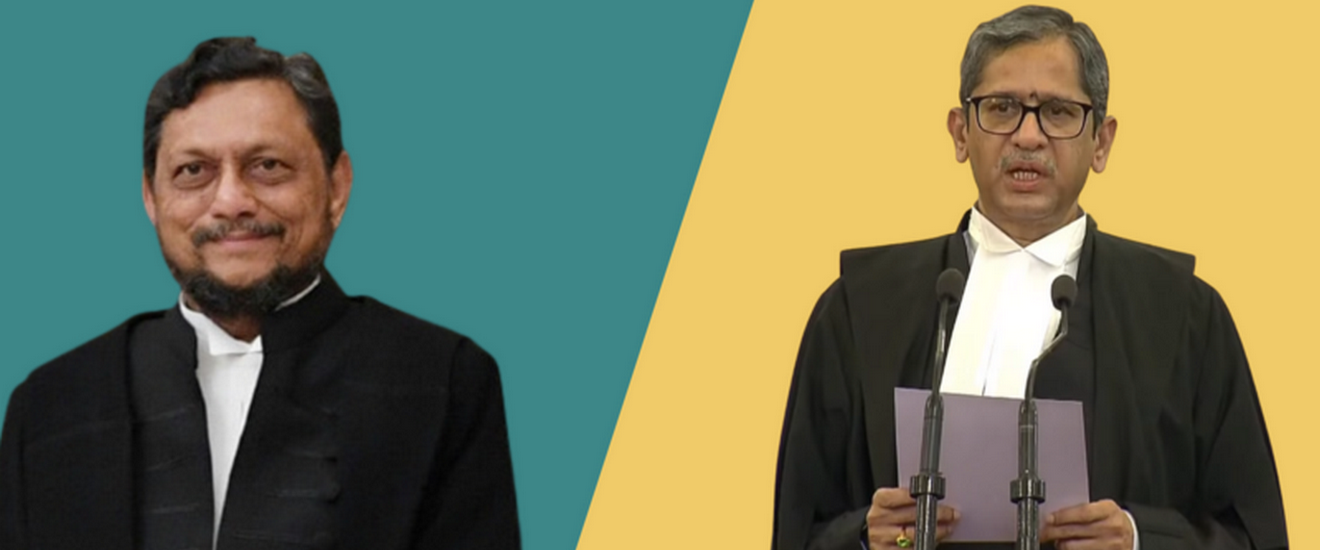Analysis
Summer Session 2021 Review
The Session was dominated by COVID-related cases, and tackling pendency. Maratha reservations were struck down, and Ramana took over as CJI.

The comparatively short Summer session this year was from April 3rd to May 9th. Between the Holi and Summer breaks, the session was dominated by the impact of the second wave of COVID-19 in India.
Important judgments and orders were pronounced on reservations and tackling pendency. On the bench, Bobde CJI retired and Ramana CJI took over as the 48th Chief Justice. Shantanagoudar J passed away during the term.
COVID Impact: Court Faces Effects of the Second Wave; Takes up Suo Moto Case
April saw an unprecedented surge of COVID-19 cases in India. The Supreme Court was not immune from the crisis. In mid-April, 50% of its staff had tested positive. The Court was pressed to announce that it would hear only urgent cases from April 22nd. After representations from the bar, it also brought forward the Summer vacation by four days to May 10th.
Initiated by Bobde CJI on April 22nd, a day before his retirement, the Court took suo moto notice of a national plan for COVID-19. It was then heard by benches led by Chandrachud J. The Court aims to ‘complement’ the High Courts, exercising a ‘bounded-deliberative’ approach. It has heard on a range of issues including the supply of oxygen, essential drugs and the vaccine administration and pricing policy. The case continues to get heard during the Court’s vacation.
Landmark Reservations Judgment: 50% Limit Upheld, States Lose Power to Identify SEBCs
The Maratha Reservations case was the only Constitution Bench which conducted hearings during the pandemic. They pronounced their judgment on May 5th. The Bench unanimously held that the 50% limit on reservations was good law, and need not be revisited. Further, the Marathas did not fall within the limited exceptions to this rule. And declared the Socially and Educationally Backward Classes Act, 2018 unconstitutional.
On the 102nd Constitutional Amendment Act, 2018, Justices Bhat, Rao and Gupta in the majority ruled that the Amendment did take away States’ powers to identify socially and educationally backward classes. The Centre was ordered to undertake the exercise of consulting States and the National Commission for Backward Classes, and expeditiously notify a new list of socially and educationally backward classes.
However, Bhushan J, with whom Nazeer J agreed, dissented. Taking a purposive approach, he held that the Amendment was not intended to deprive States of this power.
Tackling Pendency: Ad-Hoc Judges in High Courts, Guidelines in Criminal & ‘Cheque Bouncing’ Cases
Benches led by Bobde CJI issued multiple orders with the aim of addressing pendency. These included guidelines to appoint ad-hoc judges to High Courts and to ensure speedy disposal of cheque dishonour cases.
The Court issued guidelines for the appointment of ad-hoc judges to High Courts under Article 224A. The ‘dormant’ article which allowed retired High Court judges to hear cases was invoked to address pendency. The guidelines set a ‘trigger point’ of backlog after which judges could be appointed. And laid down the procedure of appointment. In a connected matter, the bench also issued an order setting a timeline for the appointment of permanent High Court judges.
In two suo moto cases, his bench also noticed pendency and unfair procedure in cheque dishonour cases and criminal trials. They issued guidelines for both, drafted with the help of amicus curiae. For cheque dishonour cases, offences would be tried jointly and affidavits could be counted as witness testimony. Cases should also not be converted to summons trials routinely without good reason.
For criminal trials, the Court ordered the implementation of uniform evidence recording and submission to make appeals quicker. It also overruled the case which held that all objections to evidence should be decided at the end. This had led to extensive and sometimes prejudicial collection of evidence.
‘Nation’, Law and Order: Rohingya Refugees don’t Have the ‘Right to Reside’; Constitutional Challenge to Sedition Admitted
In an interim order, Bobde CJI’s bench denied to order the release of Rohingya refugees. Around 170 of them had been detained in Jammu, and feared deportation. The bench held that the right to reside in India and the right against deportation was available only to Indian citizens. Further, they cited the Central government’s national security and law and order concerns.
On 30 April, the Court also admitted a challenge against the offence of sedition, or ‘exciting disaffection against towards the Government’. The petitioners have argued that the criminalisation of sedition is not a reasonable restriction to the freedom of speech. We are tracking the case here.
The Bench Changes: Ramana Succeeds Bobde as CJI, Shantanagoudar Dies
Bobde CJI retired on April 23rd, after his 8-year term. He has written 68 judgments. We looked at some of his most notable judgments, orders and cases. We also looked at the Supreme Court during his term as Chief Justice.
He was succeeded by N.V. Ramana CJI as the 48th Chief Justice on April 24th. We have looked at his tenure on the bench to date.
On April 24th, Mohan Shantanagoudar J passed away. His 6-year term on the bench was cut short. We have looked at his term through numbers and his most notable cases.